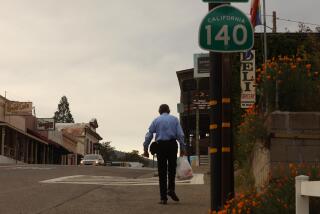Past Presents of Christmas
- Share via
On a gray December afternoon, a search for Christmas leads to Villa Scalabrini in Sun Valley.
Villa Scalabrini is a retirement home and cultural center of the Italian-American community. Its 108 residents are predominantly Italian-American. The priests who run the retirement center are members of an order founded by Bishop John Baptist Scalabrini with the mission of ministering to Italian immigrants around the world.
The retirement center’s lunchtime Christmas celebration is going full swing. Small glasses of red wine accompany meals in the spacious dining room. Santa Claus makes a triumphant appearance in a rolling cart--”direct from the Pole North,” someone says.
Santa Claus’ accent resembles that of Father Mario Trecco, director of Villa Scalabrini and editor of “L’Italo-Americano” a weekly bilingual newspaper for California Italian-Americans. Residents greet him with measured glee and dignity as he dispenses gift bags prepared by nuns in white.
As Bishop Scalabrini knew, in a city and nation where so many people come from somewhere else, Christmas can be rough. The holiday takes on a sense of loss. The immigrant must reconstruct that which is absent: country, city, neighborhood, family.
But the people at Villa Scalabrini are veterans of countless immigrant Christmases. They are frail warriors wearing the strong armor of memories and myths that preserve culture.
As the diners sing “Silent Night,” Maria Foggetta, 87, remembers the figurines of the family Nativity scene handmade by shepherds in the southern Italian province of Bari. She remembers the shepherds playing music on wooden flutes. And she cannot forget Jan. 6, 1921, the Epiphany Day when she and her family departed to join her father in America, where they would spend a month in barracks on Ellis Island.
“My mother cried and prayed,” she says, her Italian retaining the broad Barese accent. “They wouldn’t let our father in to see us. Finally he came on a boat and threw a package of food to some sailors on the island, who brought it to us. And finally my mother ate something.”
Foggetta and others review a melancholy catalogue of Little Italys decimated by urban strife and ethnic migration, skeleton communities reduced to a church, a social club, huddled shops and restaurants. Places such as North Broadway in Los Angeles, Taylor Street in Chicago, Brooklyn’s Lafayette Avenue, where the Foggettas settled.
She says her father rode a horse-drawn cart to Mulberry Street in Manhattan to buy Christmas provisions, sustaining traditions that Foggetta and her husband would later bring with them to Glendale.
“We were married 63 years,” she says. “You hear people say they were married 23 years, big deal, 43 years, big deal. Sixty-three years! The first man kissed and the last.”
After lunch, Fillippo Molinari, 97, holds court in the lounge next to the dining room. The topic is Christmas, 1916, in the mountain trenches near the Austrian border during World War I.
“It was the most terrible front of the war,” he says in Italian. “All rocks . . . The Austrians were 15 meters away.”
Molinari has dressed up for the celebration in jacket, slacks, tie and comfortable gym shoes, his cane propped against the easy chair. Molinari’s hearing isn’t what it used to be, and he sits serenely as Father Trecco and a visitor take turns bellowing questions at him. Three ladies watch from a couch, making occasional comments.
Molinari recites details methodically, like a man touching every plank of a fragile footbridge: the “famous” Christmas ravioli of his native region of Liguria; the grocery he owned in 1911 as an immigrant in Valparaiso, Chile; the cold in a Montana concentration camp for Italians, Germans and Japanese where he spent two Christmases during World War II because of his fascist sympathies, though he insists he had only respect for America.
He even remembers the numbers of his battalion and regiment during the First World War. On the 50th anniversary of his service against the Austrians, he was awarded the title of “Cavaliere” from the Italian government.
Molinari recalls an episode of goodwill.
“I jumped into a trench and there was an Austrian soldier. He threw down his rifle. He says, “I’m Italian, I’m from Trieste,’ “--a city with a large Italian population controlled by Austria at the time.
The soldier gave Molinari a piece of bread. Molinari gave the “Triestino” a lemon, and let him seek refuge on the Italian side of the lines.
“We hugged each other, and I said, ‘For you the war is over.’ ”
More to Read
Sign up for Essential California
The most important California stories and recommendations in your inbox every morning.
You may occasionally receive promotional content from the Los Angeles Times.













